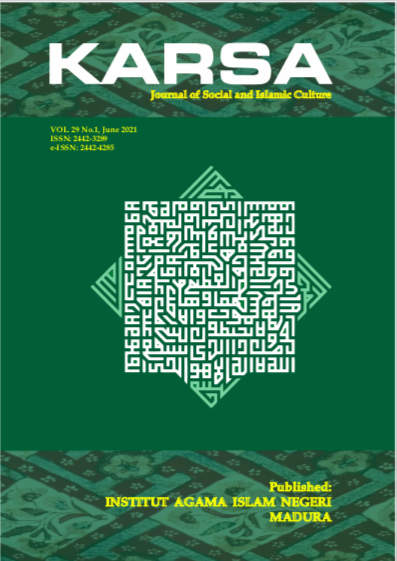Forgiveness Therapy as A Religious Conflict Resolution of Violence Conflict (Carok) in Pamekasan Madura
 Abstract views: 729
,
Abstract views: 729
,
 PDF downloads: 482
PDF downloads: 482
Abstract
This research efforts to answer the problem of conflict resolution models were used by Madurese society to resolve carok and why forgiveness can overcome carok conflict. The research tries to understand how the forgiveness stages between the parties involved in the case of carok in Madura? This research used a qualitative method to explore the power of forgiveness in the resolve of carok in Bujur Tengah Village, Batu Marmar, Pamekasan. In collecting data, the researcher used observation, interview, documentation, and triangulation techniques, while the analysis techniques used were data reduction, data presentation, and conclusion drawing. This research shows that the forgiveness model becomes a conflict resolution capable of controlling anger and retaliation to achieve true reconciliation. That is because the forgiveness mechanism has extraordinary power to rebuild the relationship or restore the effects of trauma from the victim's family. The forgiveness mechanism of forgiveness in the case of carok cannot be separated from the role of Kiai to resolve the disputes of land swap overland (village treasury) between two parties. The Kiai carries out many stages to accelerate the achievement of reconciliation; namely restoring security conditions, embracing the families of carok victims, strengthening friendship to prevent counter-conflict, the tabayyun process by presenting conflicting parties, accelerating dialogue, and holding reconciliation studies.
Downloads
The journal operates an Open Access policy under a Creative Commons Non-Commercial Share-Alike license. Authors who publish with this journal agree to the following terms:
- Authors retain copyright and grant the journal right of first publication with the work simultaneously licensed under a Creative Commons Attribution License that allows others to share the work with an acknowledgement of the work's authorship and initial publication in this journal.
- Authors are able to enter into separate, additional contractual arrangements for the non-exclusive distribution of the journal's published version of the work (e.g., post it to an institutional repository or publish it in a book), with an acknowledgement of its initial publication in this journal.
- Authors are permitted and encouraged to post their work online (e.g., in institutional repositories or on their website) prior to and during the submission process, as it can lead to productive exchanges, as well as earlier and greater citation of published work.



















